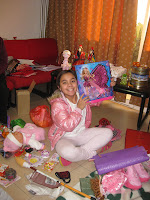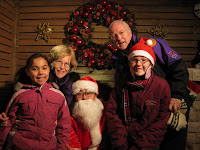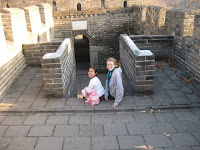



Although missing our family and friends, we had a wonderful time celebrating Christmas in Beijing. The preparatory activity is described below in “Christmas Shopping in Beijing.” Far more important is the meaning behind this wonderful holiday. We attended mass for the 4th Sunday of Advent at the South Cathedral. The South Cathedral has two Sunday masses in English and draws an international congregation. Services are longer than in the US (about 90 minutes) with a blend of traditional music and songs with which we are not familiar. Priests from the US, China and India have presided over masses we’ve attended. The priests often give longer sermons than home, with similar varying degrees of success.
For Christmas day we awoke to see that Santa had also visited China. Anna had followed Max's lead from many years ago and tied a string between her big toe and Rick's to prove Rick was Santa. Despite the string, Santa came! We then took a cab to the South Cathedral and met our friend Deborah Bender for mass. (Deborah has been teaching public health in Chengdu on a Fulbright grant and will spend her last 3 weeks in China in Beijing studying Chinese.) After a beautiful mass we then went to Grandma’s Kitchen in a hutong and met up with our friends Karen and Nathan for a traditional turkey meal and good conversation. While we missed our family and friends back home, it was a joyful celebration with our new friends in Beijing.
































